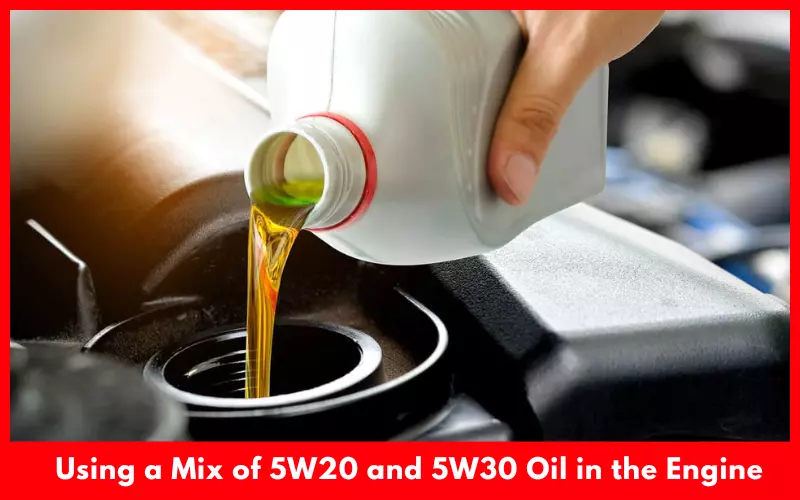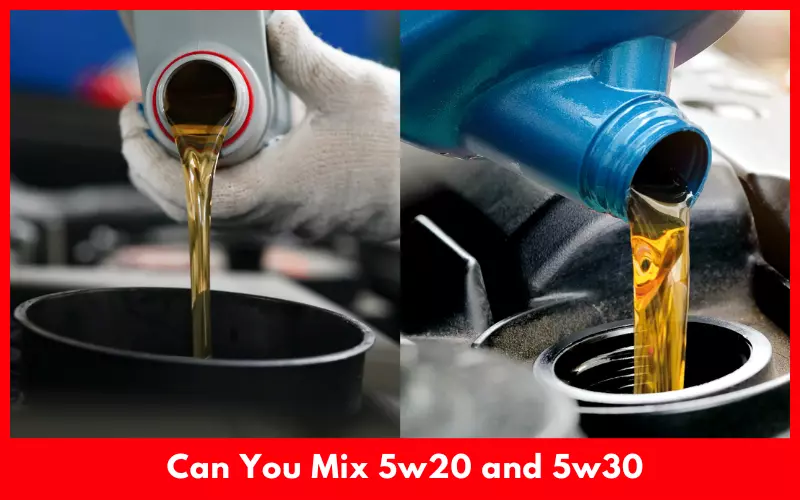5W20 and 5W30 engine oil may have the same cold start properties but they are different in terms of viscosity, fluidity and usage. But, what if your vehicle’s engine oil light turns on and you have some 5W30 and 5W20 engine oil? Can you mix 5W20 and 5W30 and top off the engine?
Yes, you can mix 5W20 and 5W30 engine oil as it won’t hurt the engine immediately. In the long run, a mixture of 5W20 and 5W30 engine oil can restrict oil movement, make the engine hotter, increase moving parts friction and reduce overall fuel economy. So if you mixed 5W20 and 5W30 engine oil or accidentally used 5w30 instead of 5w20, replace it with the right grade during the next engine oil change.
Article Summary
Can You Mix 5W20 and 5W30?
The 5W30 and 5W20 engine oil have different additive, so you shouldn’t mix them. The possibility of mixing 5W30 and 5W20 oil depends on lots of things including the mixing ratio, your vehicle’s requirement, the area you live, the oil brand, and more.
Vehicle’s Requirement
If your vehicle needs 5W30 engine oil and you top off the engine with some 5W20, it won’t hurt your vehicle.
But if your vehicle requires 5W20 oil and you use a mixture where 5W30 is more than a quart, it can hurt the engine, particularly in cold weather. If you already put in a little of the wrong type of oil, refill the engine with a quart of the right weight and grade of engine oil so it can run smoothly.
Area
In terms of the area, if you live in a hot area and use a mix of 5W30 and 5W20 engine oil, prolonged driving won’t be good for your engine. It can put extra pressure on the engine, particularly during towing a trailer or a boat. However, if you live in a temperate summer, you can use a mix of 5W30 and 5W20.
Oil Brand
When it comes to the brand, mixing two different brand’s engine oil can put your car’s engine into deep trouble as they are made of different additives. So if you need to mix 5W30 and 5W20 in an urgent situation, take the same brand of engine oil.
What Happen After Mixing 5W20 and 5W30 Engine Oil?
If you mix 5W20 and 5W30 engine oil for emergency requirements, it won’t show any immediate problem. But you may start experiencing these side effects gradually:

1. Restriction of Oil Movement
Modern engines usually have small oil ports. If you use thicker engine oil than recommended, it can restrict oil movement and damage the engine. However, thicker oil has more viscosity which is beneficial for lubing the engine parts, particularly at high-speed driving.
2. Effect the Viscosity
The viscosity rating varies from model to model and the manufacturer recommends different viscosity for different climates. If you mix 5W30 engine oil with 5W20, the oil will become thinner and won’t give the engine the desired friction protection in the warmer climate. If you want to improve lubrication, stick to the recommended grade.
But if you use 5W30 instead of 5W20, drive your car without any worry. Even this change will make the engine more secure and help it run more smoothly in very hot temperatures. In a cold northern climate, you should go back to the 5W20 before starting the severe cold weather. Sometimes car may shake after engine oil change.
3. Void the Warranty
Another concern is that using a mix of oil instead of being stick to the recommended grade can cause you to lose the factory warranty. If you have engine trouble and the manufacturer discovers the wrong oil in the engine, they’ll void your warranty.
If your car engine already exceeds the warranty, still this change can give you less gas mileage. However, it’ll protect your engine better in the hot weather.
4. Decreased Fuel Economy
If you use a mix of 5W20 and 5W30 oil in your engine, it won’t lubricate the moving parts properly. So the engine may become hotter. If your engine gets the wrong grade of oil, it won’t provide the desired performance which will affect the fuel economy. So you’ll have fewer miles per gallon due to the engine’s harder work.

5. Irritating Noise
If the engine’s parts don’t get enough lubrication, they’ll start grinding with each other. Hence you’ll hear irritating noise during driving the car. The moving parts may also wear out quickly due to the excessive grinding.
Can You Use 5w30 Instead Of 5w20?
It isn’t beneficial to use 5w30 engine oil instead of 5w20 as they have different viscosity. If an engine calls for 5w20 engine oil, it needs this grade of oil to be operated smoothly. After reaching 212 degrees operating temperature, the engine’s components that contact with oil need certain viscosity.

If you use the right grade of engine oil, it’ll flow more smoothly with the least resistance. But if you use 5w30 oil in an engine that is rated for 5w20, the engine oil will flow with more resistance. As a result, it’ll reduce the engine efficiency and put the endurance at risk.
Using thicker oil than the recommendation will also increase the friction inside the engine. Hence you can experience several problems like engine deposits, oil leaks, and slush buildup. Since the 5w30 has more resistance than the 5w20, it’ll force the engine to work harder during running.
Difference Between 5w-30 and 5w-20 Engine Oil
Let’s start with the basic. The Society of Automotive Engineers (SAE) set a numerical code system to grade motor oil depending on its viscosity characteristics. The number before W refers to the engine oil’s viscosity at low temperatures. The lower the number, the thinner the oil and better for cold temperatures. The number after the W indicates the thickness of the oil at the normal operating temperature of the engine.

Since both grades of oil have 5W, they have the same cold start properties. The 30 and 20 are the thickness of the oil during operating temperature (80 to 90 degrees Celsius). So the 5W30 oil is thicker than the 5W20 engine oil.
Key differences between 5w20 engine oil and 5w30 engine oil:
| Features | 5w20 Engine Oil | 5w30 Engine Oil |
| Thickness | Thinner | Thicker |
| Viscosity | Less viscosity | More viscosity |
| Weather | Ideal for cold climates | Ideal for high temperature |
| Performance | Exceptional fuel efficiency | Less fuel efficiency |
| Function | Flows quickly with less friction | Flows slowly due to more friction. |
Viscosity
The key difference between the 5W30 and 5W20 oil is in the viscosity of the oil at normal operating temperature. The 5W30 engine oil has higher viscosity compared to the 5W20 oil in a hot engine and it remains slightly thicker at operating temperature.
It can be beneficial in high mileage or driving a vehicle during high-temperature climates. However, they have the same viscosities in a cold engine.
Flow Rate
At engine temperature (212°F), 5W30 flows faster than 5W20 oil. However both oils are 5W grade, so they will flow easily in very cold climates or during starting a vehicle in the middle of the cold winter.
Polymers
Both 5W30 and 5W20 engine oil start with a base stock of 5W oil. These also contain long-chain polymer to reduce thinning at higher temperatures. In comparison, 5W30 has more polymers than 5W20.
Weather
5W20 engine oil is preferable for the winter season as it causes less friction and helps lubricate the engine faster. So if you need to lubricate the engine in winter, go for 5W20 oil. In contrast, 5W30 oil is ideal for the summer season as it is extremely efficient during hot climates. This oil is thicker than its counterpart and keeps the engine cool during hot weather more effectively.
Also Read: Can You Mix 5W30 and 10W30 Engine Oil?
FAQs
Is 5W20 or 5W30 Better for High Mileage?
5W20 oil is better for high-mileage motors particularly if the engine suits it. Otherwise, you can use considerably thicker engine oil like 5W30 for high mileage. It’ll protect your car’s engine and won’t put excessive strain during the long run.
Can You Use 5W30 Instead of 5W20 in Ford?
Yes, you can put 5W30 oil in your Ford Edge engine instead of 5W20. Many mechanics believe that using multi-grade oil is beneficial for an engine with 5W specifications. But keep climate change and engine temperature in mind.
Can You Mix 5W30 Engine Oil with 10W30?
Yes, you can mix 5W30 oil with 10W30 oil as both oils act similarly in hot climates. Even both of the engine oil has same viscosity at the engine’s operating temperature. So if you have a 10W30 engine, you can put some 5W30 oil on it.
Final Words
In the end, you can mix 5W20 and 5W30 for emergencies. But the car’s engine isn’t a good option for experiments and frequently using a blend of 5W20 and 5W30 oil can damage the engine in several ways. So follow the recommendation of your car’s manufacturer and enjoy the safest and best driving experience in any climate.

